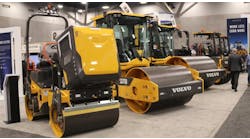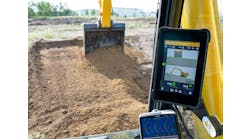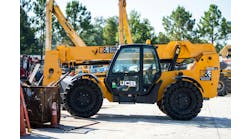IPAF Launches 2025 Global Safety Campaign: Stop Overturns! Safety Starts on the Ground
- Fatal overturns on MEWPs increased by 50% from January 2021 to December 2023*[i].
- Instability leading to overturn is one of the top four industry causes of lost time incidents (LTIs) annually.
The International Powered Access Federation (IPAF) has launched its Global Safety Campaign for 2025: Stop Overturns – Safety Starts on the Ground!
IPAF’s annual safety campaign, informed by data from its global Accident Reporting Portal, delivers a crucial message to the powered access industry. This year’s campaign focuses on the serious and often fatal consequences of mobile elevating work platform (MEWP) overturns. These incidents can result in operators and occupants being ejected from the platform and create complex rescue scenarios for those trapped at height during a partial overturn.
The latest statistics informing this year’s campaign revealed that:
- Fatal overturns increased by 50 percent from January 2021 to December 2023.
- In the last decade, 108 fatalities, 64 major injuries, and 25 minor injuries, were reported and attributed to overturns incidents involving MEWPs. Sixty-four percent of overturns were reported from North America, 18 percent from Europe, and 22 percent from Asia.
- The occupation most affected was MEWP operators, with a small number from delivery drivers, technicians/engineers, company staff and the public.
- Of these 108 recorded fatalities, 52 were recorded in 2021-2023, and 33 percent of overturns happened on a 3A mobile scissor, followed by 1B static boom (28 percent), 3B mobile boom (23 percent) and 1B static boom (12 percent).
- Instability leading to overturn is commonly among the top four industry causes of lost time incidents (LTIs) annually.
- MEWP overturns typically occur during setup, travel, or operation on inadequate or unsuitable ground or floor conditions. They can also occur while moving category 3A and 3B MEWPs across unsuitable terrain in either the elevated or stowed positions.
- The most common places for incidents to occur are construction premises, public areas, roads and highways, and rental yards.
- Non-fatal injury types result in fracture, concussion, bruising, impact pains, and cuts and lacerations.
Overturns cause serious injuries and fatalities
Reflecting on the Global Safety Campaign release, IPAF’s head of safety & technical, Brian Parker, said: “MEWP overturns continue to be a major cause of serious injuries and fatalities in our industry. With the launch of IPAF’s 2025 Global Safety Campaign – Stop Overturns: Safety Starts on the Ground! – we are reinforcing a crucial message: ground conditions matter. By understanding the risks and implementing proper safety measures, we can prevent overturns, protect lives, and create safer work environments worldwide. Let’s work together to make a significant impact and aim for a measurable decrease in MEWP overturns globally."
Led by Brian Parker, head of safety & technical at IPAF and Alana Paterson, head of health, safety & environment at Taylor Woodrow, and chair of the IPAF International Safety Committee, the campaign emphasizes when overturns occur, the hazards and risks – from injuries and fatalities to disruption of worksite and psychological impact – along with ways to manage and minimize the risks.
Recognizing the global reach of the campaign, IPAF has developed new industry guidance: The Assessment of Ground Conditions and Supporting Structures for The Safe Use of MEWPs. It is split into two parts: guidance for MEWP users, with sections on dewatering, suspended floors, and temporary works, and guidance for MEWP operators, focusing on the MEWP travelling on uneven ground, elevated, stowed position, slopes and positioning.
Other guidance in the overturns global safety campaign includes:
- A risk assessment should be conducted during the planning phase. This must include evaluation of the ground/support structures that MEWPs are to be positioned or travelled on to ensure they are safe.
- A MEWP pre-use inspection should be carried out by the operator prior to each use.
- A ground assessment should be made by the operator prior to each use of the MEWP.
- Walk the route: if a MEWP is to travel from one area to another, the operator should identify potential hazards by walking the route prior to MEWP operation.
- MEWP maintenance: owners should keep MEWPs in a safe-to-use condition in accordance with manufacturer’s specifications and industry standards.
- Quality operator training: employers should ensure all their operators are adequately trained and familiarized.
As the campaign launches, IPAF urges industry participation, implementation of recommended safety measures, and the reporting of incidents to facilitate ongoing safety improvements. Together, we can prevent and reduce overturns incidents and safeguard the well-being of operators and platform occupants in MEWPs.
For more information about Stop Overturns – Safety Starts on the Ground! and other IPAF safety campaigns, visit https://www.ipaf.org/en-gb/campaigns
[i] According to data collated via IPAF’s global accident reporting portal. The accident portal is a global facility where incidents and accidents can be reported anonymously. Data is analysed annually for trends and used to inform training course content, improve existing guidance and identify messages of global safety campaigns. More info at www.ipaf.org/accident






